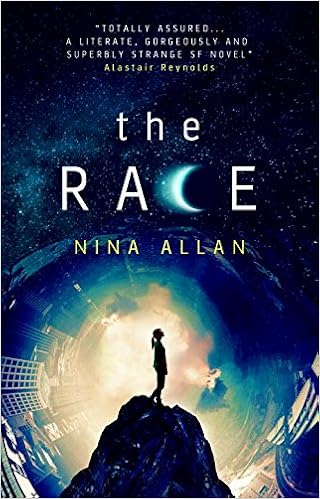A few words of recommendation about this excellent book from Nina Allan. I'll say upfront: this book is almost impossible to talk about without spoilers. You have been warned.
The Race is a complex, experimental novel of multiple narratives, each of which seems to ripple out from the previous one. It eases you in gradually, with a first section that seems, initially, to be a well-written but relatively simple science-fiction story. It tells the story of Jenna, living in a place called Sapphire, a town in an alternative version of England, after some disaster. Sapphire is a place with little going on apart from the racing of genetically modified 'smart-dogs', a sport which Jenna and most of the other characters are involved with, one way or another. This includes her brother Del, a shady character - the plot hinges around Del's schemes finally catching up with him, affecting his family and Jenna herself. Sapphire, whilst an interesting setting, is something of a backwater, and the reader might confidently predict that Allan will expand the scope later in the novel, zooming out to explain more about this world and how it came to be... that's how these kind of stories work, right? Well, Allan certainly does zoom out, but not in a way anyone is likely to predict.
(If you ignored the spoiler warning above, they really are coming now.)
The second part of the novel immediately pulls the rug from under us–it is set in our real world, and focuses on a character called Christy. Christy is an author, and she writes stories which are set in the town of Sapphire... Christy, like Jenna, has a brother whose violent actions destroy the relationships of those around him. The reader is given to understand that the fictional events of the first part of The Race are, at least in part, a reflection of this second 'non-fictional' section. But is Christy writing to explore her own experiences, or to hide from the implications of them?
And so The Race continues, with each part raising questions about the last (and the whole). There's a further section set in our world, in which Christy features but as a secondary character, which sheds new light on her brother and those caught up in his wake. And there are sections set back in the science-fiction world we encountered originally, although far away from the initial town of Sapphire. It's never spelt out exactly when in her story Christy wrote each of these sections–what did she know about the dramatic events of her own life at the time of writing each fiction? How much do the stories Christy writes reflect her experiences and how much pre-figure them? The relationship between fact and fiction in The Race seems as much a feedback loop as anything linear.
As you might expect from Allan, the book is exceptionally well written. The menacing, bordering on surreal ending of Section 2, where the unreality of fiction seems to bleed into the real world, is a particularly highlight. Even better is a stunning set-piece later in the book in which a ship at sea is menaced by a gigantic whale; it's a genuinely terrifying and awe-inspiring scene, as the passengers fear their ship will be capsized in the black oceans. The idea of such a threat, emerging from nowhere to engulf everything, seems an apt metaphor for the acts of violence, small and large, that are scattered throughout the worlds of The Race.
In summary, this is an excellent book, structurally sophisticated yet gloriously readable. Highly recommended.
